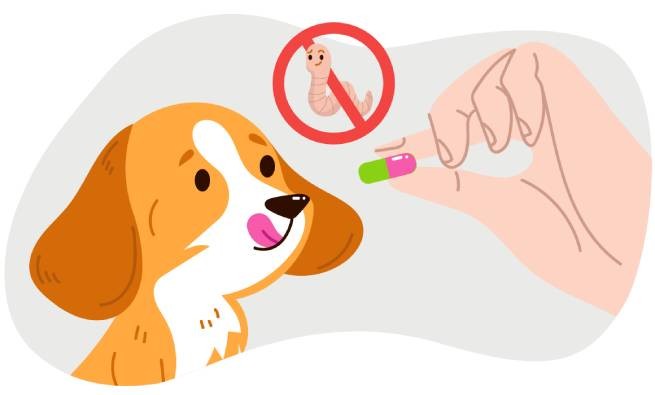All children dream of a dog, and parents, as a rule, after some resistance, often “give up.” A small fluffy ball given to a child evokes universal tenderness and delight. But…
Does everyone know that even at one month of age a dog can be infected with worms and be a source of their spread? Regardless of the conditions of detention, an animal can become the owner of uninvited guests as a result of eating raw meat or seafood, sniffing excrement on a walk or swallowing an insect, and even faithfully licking the owner’s street shoes. Given the relevance of the problem, you should get to know it better.
Types of worms
There are many different types of worms, but the most dangerous to dogs are:
- Round – cases of infection of puppies in the womb are not uncommon.
- Tape – enter the dog’s body by eating a dead infected animal or through fleas.
- Pulmonary nematode – infection occurs through contact with snails and slugs, and through fox droppings.
- Trichocephalus and hookworm – dogs become infected by running on the grass.
- Cardiac – carried by various insects, including mosquitoes.
The negative impact of worms on the body – why you may need immediate help from a veterinarian
The presence of helminths in a dog is not only undesirable – it is extremely dangerous. In addition to constant intoxication, their presence can lead to many extremely undesirable consequences, as a result of which the dog will be in a serious condition:
- Heartworms and lungworms can cause excessive bleeding from minor trauma because they interfere with blood coagulation. There may also be difficulty breathing, which can lead to paralysis and even death;
- prolonged constipation and intestinal rupture are possible with an abundance of roundworms and the formation of balls of them;
- chronic exhaustion is fraught with unpleasant ailments, and intoxication can lead to severe poisoning.
The presence of parasites is especially dangerous for puppies; their fragile bodies are not able to resist the harmful effects of helminths, and often the baby dies.
Signs of helminths – when a visit to the veterinary clinic is necessary
An attentive owner will definitely notice the appearance of some symptoms in the pet that indicate the presence of parasites. Some of them are clearly expressed, others are absent or questionable:
- excessive appetite due to weight loss;
- liquid stool or, conversely, constipation;
- hiccups after feeding;
- itching in the anus, anxiety and “riding on the butt”;
- the presence of worms or their eggs in the feces;
- unpleasant odor from the mouth;
- in case of severe infestation, vomiting containing worms;
- lethargy and weakness, especially noticeable in puppies.
If you find these signs, you should not ignore them – a visit to the veterinary clinic will save you from possible dangerous consequences.
Treatment and prevention: veterinary clinic or just a pharmacy
A huge selection of anthelmintic drugs makes you want to deal with the problem yourself, which is extremely undesirable. If parasites are detected, you should seek the help of specialists. The required drug is carefully selected by the veterinarian, taking into account the age of the pet, its size and weight, and the type of worms present. An overdose or the wrong choice of medication can cause irreparable harm to the dog’s health and even cause its death.







More Stories
What to do if attacked by a dog (video)
Greece – a paradise for gourmets
Message from AEK and PAOK fans in defense of Esphigmenou Monastery